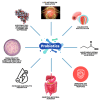The Potential Impact of Probiotics on Human Health: An Update on Their Health-Promoting Properties
- PMID: 38399637
- PMCID: PMC10891645
- DOI: 10.3390/microorganisms12020234
The Potential Impact of Probiotics on Human Health: An Update on Their Health-Promoting Properties
Abstract
Probiotics, known to be live microorganisms, have been shown to improve or restore the gut microbiota, which in turn has been linked to improved health. It is believed that probiotics are the modern equivalent of a panacea, with claims that they may treat or prevent different diseases both in children and adults (e.g., from colic in babies to cardiovascular disease, respiratory infection, and cancer in adults). Ever since the early 2000s, probiotic-based fermented foods have had a resurgence in popularity, mostly due to claims made regarding their health benefits. Fermented foods have been associated with the prevention of irritable bowel syndrome, lactose intolerance, gastroenteritis, and obesity, but also other conditions such as chronic diarrhea, allergies, dermatitis, and bacterial and viral infections, all of which are closely related to an unhealthy lifestyle. Recent and ongoing developments in microbiome/microbiota science have given us new research directions for probiotics. The new types, mechanisms, and applications studied so far, and those currently under study, have a great potential to change scientific understanding of probiotics' nutritional applications and human health care. The expansion of fields related to the study of the microbiome and the involvement of probiotics in its improvement foreshadow an era of significant changes. An expanding range of candidate probiotic species is emerging that can address newly elucidated data-driven microbial niches and host targets. In the probiotic field, new variants of microbiome-modulating interventions are being developed, including prebiotics, symbiotics, postbiotics, microbial consortia, live biotherapeutic products, and genetically modified organisms, with renewed interest in polyphenols, fibers, and fermented foods to ensure human health. This manuscript aims to analyze recent, emerging, and anticipated trends in probiotics (sources, doses, mechanism of action, diseases for which probiotics are administered, side effects, and risks) and create a vision for the development of related areas of influence in the field.
Keywords: fermented food; health; microbiome; microbiota; probiotics.
Conflict of interest statement
The authors declare no conflicts of interest.
References
-
- Facts Sheet—The Microbiome and Probiotics Interaction, International Probiotics Association. [(accessed on 26 November 2023)]. Available online: https://internationalprobiotics.org/wp-content/uploads/2021_IPA_Fact-Pro....
Publication types
Grants and funding
LinkOut - more resources
Full Text Sources


